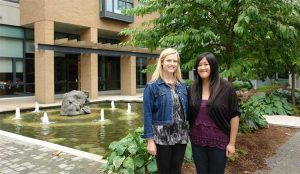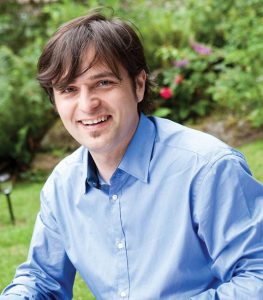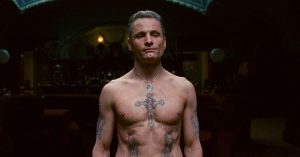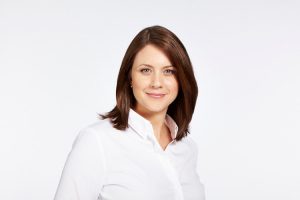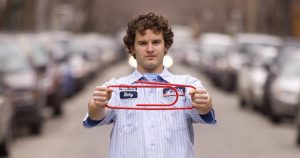Meet BA ’06 Cait McKinney: Uncovering subversive and politically charged historical valentines
Sending valentines may not be the most obvious method of political campaigning, but it was one of the ideas adopted by the Congressional Union for Woman Suffrage in their campaign for the vote.
Cait McKinney (BA English Honours, ’06) came across these witty and pointedly political historical records as part of a research project completed for the English honours seminar she took in her final semester of study at UBC with Professor Mary Chapman.
Political Persuasion
The valentine cards, sent to anti-suffrage American congressmen and President Thomas Woodrow Wilson on Valentine’s Day 1916, are personally tailored messages that used tongue-in-cheek rhymes and cartoons to advocate for suffrage. McKinney’s project and website includes reproductions of the previously unpublished valentines accompanied by critical annotations and an essay.
Working With Experts
To compile it, McKinney worked closely with the Sewall-Belmont House and Museum in Washington, DC, dedicated to the evolving role of women and their contributions to society through the continuing story of women’s pursuit for equality. Museum staff helped McKinney track down some of the valentines, and also scanned these for the project. The Sewall-Belmont House recently featured McKinney’s website in their online newsletter, a publication that reaches more than 2,500 readers.
“I wanted the students to experience, even vicariously, the thrill I have when I go to the archives and snoop around and find things,” says Professor Chapman, who taught the research-based seminar on American suffrage print culture. Prior to teaching the course, Chapman had conducted research in Sewall-Belmont House archives.
Primary Research A Great Learning Opportunity
“Most of the research that we get to do as undergrads is a new take on things that have already been done,” adds McKinney, who welcomed the opportunity to tackle research involving primary sources and then present her findings using the web. “Dr. Chapman wanted us to explore how we could use the Internet as a tool for letting other people gain access to either research that has not gotten a lot of attention, or is in danger of effectively going out of print,” McKinney says. “That’s particularly a big issue when you’re talking about women’s history because sadly there’s still not a lot of money devoted to publishing this kind of stuff,” she adds.
When McKinney first signed up for the honours seminar, she thought studying the suffrage movement would be a drag. Her original research gave her the chance to find an angle that interested her — the valentines and their representations of female sexuality. “It’s an example of how suffragists were really cunning in the way that they formed their arguments and eventually managed to win the vote by appealing to men on their own terms,” said McKinney. “They’re playing with the male idea of woman-as-object to be sexually conquered —they’re throwing it back in their critics’ faces. That’s why these valentines are so subversive and so effective: because they take the argument that was always thrown at feminists during that time period — that women were to be controlled and used by men and were not suited to voting — and make it their own.
More about McKinney
McKinney was a well-known undergraduate at UBC — she edited the AMS Insider, the student planner that is distributed to students every year. She also worked at the wellness centre as a peer educator and was active with the UBC Film Society as advertising manager and social coordinator. While she has plans to get back to school to pursue graduate studies in cultural theory, in the long term, she plans to continue doing what she’s doing now — writing with a youth focus. She currently works as a writer and researcher for Free The Children in Toronto, an international charity that seeks to raise awareness of global poverty amongst youth, and empower young people to realize that they can have an impact on the world.
By Alexandra Chu, BA ’07 in English Literature and a minor in History.
Meet Alvin Singh: Building a unique degree
The interdisciplinary studies program has allowed Alvin Singh to customize his education. His program is centered on three core components: political science, international development, and policy studies. “A specialized education doesn’t always give you the skills necessary to function properly in a flexible work environment. More and more I’m finding that the jobs I’m attracted to — jobs that a lot of young people are attracted to — are extremely flexible.”
Meet Karrmen Crey and Amy Perreault: Creating change through storytelling
As a directed studies project in the First Nations Studies Program, Karrmen Crey and Amy Perreault recently completed What I Learned in Class Today, a film documenting the responses of nine students to intentional and unintentional occurrences of racism.
Karrmen Crey and Amy Perreault say their video project began as a vent session in a course they were taking with First Nations Studies Professor Linc Kesler.
“We would start the class by telling stories about classes we were in,” relates Crey, a recent graduate of the program.
The stories, she adds, were a way of dealing with some of the offensive and ignorant statements they had heard about Aboriginal people — not on the street, but right in their classes at UBC.
“They were kind of funny, they were, of course, kind of absurd,” Crey says of the remarks of some UBC students and professors.
The statements were profoundly hurtful, often for no other reason than the fact that non-Aboriginal students sometimes forget that in talking about the historic challenges faced by Canada’s First Nations, they are talking about issues that Aboriginal students among them have experienced themselves.
Noting a pattern, Kesler observed that it would be a good idea to gather the stories of Aboriginal and non-Aboriginal students alike.
That suggestion lit a fire under Crey and Perreault — both senior undergraduate students at the time. They were highly interested in developing a resource that would help fellow students and faculty discuss sensitive inter-cultural issues without hurting, or alienating people.
As a directed studies project in the First Nations Studies Program, Crey and Perreault recently completed What I Learned in Class Today.
Video, they discovered, was a perfect medium, especially for getting uncomfortable first-person experiences out in the open.
They’ve screened a preliminary version of the video at several forums, including UBC’s Realities of Race conference in March 2007. In each case, audience members have been struck by the honesty of the students, who express their stories in their own words.
“You read a report, you can look at statistics, but actually being faced with students at UBC right now who are experiencing these things is pretty powerful.”
Dara Kelly is one Aboriginal student interviewed in the film. A member of the Fraser Valley Le’qa:mel First Nation, Kelly was in an English class with a focus on Aboriginal authors last year when one student prefaced a group discussion by asking why Aboriginal people were so “screwed up.”
For Kelly, that comment felt like a slap in the face, and in the film she candidly discusses why she finds the remark totally unacceptable.
“At the same time, when that kind of incident happens, it’s almost so shocking, or unbelievable, or hurtful that nobody says anything, and nobody knows what to do,” she says.
That’s one of the reasons Crey and Perreault created the video in the first place — the aim is to talk about these discussions, and to acknowledge that these aren’t just difficult for Aboriginal students.
People may recognize that something is racist, or insensitive, but not know what to do, or say, underscore Crey and Perreault.
Crey and Perreault say they intend to widen the scope of the project and add more interviews, as well as related classroom material, to accompany the film.
With the broad goal of removing an institutional barrier to Aboriginal post-secondary education, they plan on crafting their project to make it a resource for teachers at UBC and other institutions, something relevant to larger, multi-ethnic audiences.
“This video is here and it’s available,” Perreault says, “so let’s start talking about it instead of not talking about it, or talking about it in the hallway after class.”
———
By Bryan Zandberg (BA, 2006, in French and Spanish). Bryan is a former editor with The Ubyssey.
Meet Rhodes Scholar and BA ’05 Grad Mathew Chan: From UBC to Oxford
Desire to serve motivated Rhodes Scholar.
In 2005, Matthew Chan, then an economics major, joined a long line of UBC alumni to have received the honour, which included a $100,000 scholarship and a two-year invitation to study at Oxford University in England.
What’s it like to win one of the world’s oldest and most prestigious scholarships?
In 2005, UBC economics student Matthew Chan found the answer to that question. As the Rhodes Scholar for British Columbia that year, Chan joined a long line of UBC alumni to have received the honour, which includes a $100,000 scholarship and a two-year invitation to study at Oxford University in England.
Chan, who recently wrapped up an economics undergraduate degree at UBC, is using his Rhodes scholarship to pursue two Master’s degrees at Oxford — the first in global health science and the second in economics for international development.
A native of Vernon, BC, Chan says he intends to work with developing countries to improve health measures. Despite his age, he has already garnered international field experience through summer volunteer work.
In 2005, Chan spent six weeks working with an AIDS outreach program for a Ugandan charity organization. The summer before, he volunteered with the BC-based Hope International Development Agency to build a school in a small rural community in the Dominican Republic.
Chan says his desire to help others was first sparked during a trip he made to China as a 12-year-old. He and his parents were visiting Ningxia, a province in northwest China, where he encountered sick children, many of whom had bellies swollen from hunger and malnutrition.
"What I saw there really affected me," Chan says. "It shaped my attitude and opened my eyes to the rest of the world."
Along with his academic and community endeavours, Chan enjoys running and playing intramural basketball.
Prior to studying at UBC, Chan attended San Diego State University, where he received the rowing team’s most valuable rower award and a Scholar-Athlete award. Both at high school and during his first year at Okanagan University College, Chan played on the men’s basketball team.
"UBC is extremely proud to have one of our students named to this distinguished scholarship," said Brian Sullivan, UBC vice-president of students. "Matthew has achieved not only outstanding academic excellence, he has already demonstrated remarkable commitment to global citizenship."
The Rhodes Scholarships, established in 1902, were designed to bring outstanding students from across the world to study at Oxford University, in the interests of promoting international understanding and public service.
Since UBC’s inauguration, 64 students from the UBC have won the scholarship — nearly two-thirds have come from the Faculty of Arts. The scholarship requires a high level of literacy and scholastic achievement, strong qualities of leadership and character, and evidence of public service.
Previous to Chan, UBC physics undergraduate Michael Rivers-Bowerman won the scholarship in 2004. He went on to pursue two years of undergraduate studies in politics, philosophy and economics at Oxford, with the intent to further his interest in medical physics and the technology involved in detecting, diagnosing, and treating cancer patients.
Past scholars include former Canadian Prime Minister John Turner, a UBC Arts alumni who majored in Political Science. John Turner will be recognized fall 2007 with the Alumni Award of Distinction.
Meet BA ’07 Lisa Davidson: Witnessing Cambodia
While many students spend their summers backpacking through Southeast Asia, Lisa Davidson traveled to Cambodia for an entirely different reason — she wanted to learn about children’s rights and labour, not from a textbook, but in the flesh.
Nick Angiers: Discovering a love for the Chinese language
Nick Angiers (BA ’08) stumbled into Chinese after completing all the courses he could take in Japanese. Angiers graduated with a BA in Asian Languages and Culture, specializing in Chinese. He’s fluent in four languages: English, French, Japanese, and Chinese.
Meet Postdoctoral Fellow Stefan Dollinger: Putting English students in the lab for the Dictionary of Canadianisms
UBC Postdoctoral Fellow Stefan Dollinger is taking English students out of the classroom and placing them into the lab as he heads the revision of the Dictionary of Canadianisms.
The project will be the first of many to come out of the Canadian English Laboratory and aims to provide an updated version of the Dictionary of Canadianisms on Historical Principles (DCHP2). Published in 1967, the first edition was not consistently maintained, leaving it outdated. Dollinger hopes to update the Dictionary while adding new entries from the last 40 years.
The team behind the second version of the Dictionary of Canadianisms has already discovered several new “Canadianisms”, or words and phrases that are unique to Canadian English. There are even some examples of words that originated on the UBC campus.
They’ve found that the oldest citation of the word “creamo” dates back to a 1925 version of the Ubyssey newspaper. Similarly, the drink “Brown Cow” was traced back to a 1976 edition.
Dollinger, who is involved in many research projects with the Canadian English Laboratory, hopes for the success of the Dictionary to be widespread. He aims to make the Dictionary available to Canadian universities and libraries to ensure the general public has access.
The Canadian English Laboratory employs many volunteer and paid student workers, including third year English honours student Sam Chung, and fourth year English Language student Cicily Cooper.
“I’m a research assistant in the Canadian English Language Lab,” Cooper explained, “We ‘harvest’ citations from periodicals we get through huge databases and find words that are Canadianisms.”
“I’ve even found some from the 1700s and 1800s!” Chung said. “We enter the words into the Bank of Canadian English and that’s pretty much it.”
Chung and Cooper both got involved with the project after taking Dollinger’s English 229 class on Canadian English words. Students in the class were asked to research Canadian words for a project; those that did well were given the opportunity to volunteer or work with Dollinger in his lab. Dollinger tries to include some work with the Bank of Canadian English in most of his courses.
Cooper and Chung excelled in their positions and were given paid part-time positions for the summer.
In addition to working with the Dictionary, Chung and Cooper were able to present their research at the Multidisciplinary Undergraduate Research Conference (MURC) last year. They were part of a five person student research team that worked with Dollinger to create a presentation for the conference. Their panel was one of only two groups presenting research in English, which Chung thinks is a shame.
“People have a mentality that research is exclusively reserved for sciences,” Chung said, “MURC was predominantly Science students with the odd Arts students who were mostly from Psychology.”
“I really want to see more Arts students presenting!”
Chung cites Dollinger’s help in the MURC as invaluable, and is grateful for the close relationship they have developed.
“He taught me everything step by step; he’s really caring.” Chung said, “The thing about Professor Dollinger is that he uses students as instruments of research so you’re not just working under him, you’re working alongside him.”
“I’m very indebted to him,” Chung added.
Cooper enjoys being a part of something that hasn’t already been studied in a classroom.
“As an undergrad you rarely feel like you’re a part of something new and different,” Cooper explained. “That’s what’s cool about being in research. I’m finding things that haven’t been found before.”
“I think it’s helped me realize all the opportunities that are out there and feel less limited. Doing this research has made me see there’s more than I can imagine!”
By Meghan Roberts (BA 2008, English Literature and International Relations).
Meet Film Studies student Dax Sorrenti: Invisible Canada – Canadian film abroad
Undergraduate student Dax Sorrenti explores international perception of David Cronenberg’s film Eastern Promises. Sorrenti, a film studies major, is using the popular movie to gauge international opinion of Canadian film. For his research, he studied reviews to see if they mentioned any Canadian elements.
Meet BA ’00 Sarah Galashan: Aiming for the front page
Sarah Galashan had wanted to be a journalist since age 16, and after she gained experience volunteering and interning at various news stations, she realized she thrived off the adrenaline in the fast-paced news environment. Sarah graduated from UBC in 2000 with a BA in Canadian Studies.
Meet Kyle MacDonald: From a Red Paperclip to a House
When Kyle MacDonald set out to get a house, he decided that a 9-to-5 job was not the most interesting strategy for success. Instead, he began a series of trades, beginning with one red paperclip that would eventually lead him to fame and his ultimate goal: a house.
When asked what inspired him to start his journey to trade a paperclip for a house, Kyle MacDonald laughed and said “procrastination.” MacDonald, a UBC Geography alumnus, always had a patchwork of random jobs, from planting thousands of trees in his summer months to working part-time contracts. Like many recent graduates, MacDonald was hesitant to commit to a permanent position.
When MacDonald and his girlfriend made the decision to begin saving for a home of their own, he knew he must commit to furthering their goal. MacDonald was able to use this motivation and skills he learned from his Arts experience to forge his own path.
Influenced by a game he played as a child, “Bigger and Better,” MacDonald made the decision to trade his way to a house. The object of the game is to trade a small object for an object of greater value, continuing to achieve the most gain at the end of the allotted period of time. MacDonald armed himself with a red paperclip as his first item and began advertising online for the first trade.
He kept a detailed account of the objects he received and the trades he made. Such items included a fish pen, a snowmobile, an afternoon with rock star Alice Cooper, a movie role, and, of course, the house in Kipling, Saskatchewan.
MacDonald’s success was publicized worldwide: He has a two-page feature in Ripley’s Believe it or Not! …the Remarkable Revealed; appeared on Weekend Today on NBC; and now has his own book entitled: One Red Paperclip: Or How an Ordinary Man Achieved His Dream with the Help of a Simple Office Supply.
A transfer student from Simon Fraser University, MacDonald was drawn to UBC’s vibrant community and thriving social scene. The potential to expand his personal network and the variety of events available to students made his decision effortless.
MacDonald capitalized on these opportunities by choosing to live in one of UBC’s most active residences: Totem Park. He felt that his time in Totem Park allowed him to refine his networking and organizational skills.
“Living away from home [makes you appreciate] what can transpire when a bunch of people live in the same place together,” MacDonald explains, “I realized you could make things happen very fast.”
His advice to students? “University should not be for getting a job,” MacDonald passionately advocates. He believes that students should be at university because they want to expand their knowledge.
By Meghan Roberts (BA 2008, English Literature and International Relations). Meghan was a contributor to The Ubyssey
